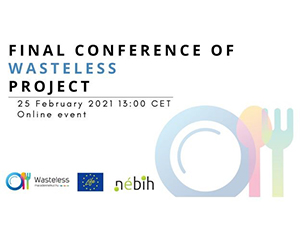Hungary

date: 24/03/2021
In 2016, the National Food Chain Safety Office (Nebih) launched the Wasteless Project, the national food waste prevention programme of Hungary, with the financial support of the European Union’s LIFE Programme*.
Although the official project period has now come to an end, the programme will continue with national resources. In order to celebrate this important milestone, the team organized the Final Conference of the project, during which the project’s most important achievements, as well as its future plans, were shared with participants.
The online conference was held on 25 February 2021. Mr Angelo Salsi, Head of Unit, Executive Agency for Small and Medium-sized Enterprises (EASME) and Mr Lajos Bognár, Chief Veterinary Officer and Deputy State Minister of Hungary addressed a welcome message to the participants. The keynote speech was delivered by Ms Alexandra Nikolakopoulou, Head of Unit, Farm to Fork Strategy, Directorate-General for Health and Food Safety, European Commission.
Mr Gyula Kasza, the coordinator of the project, provided an overview of the most important achievements of the last 4 years. The awareness-raising campaign had more than 90 million views, while more than 300 000 children were involved in the school programme of Wasteless. The project also supported two household food waste measurement studies, conducted according to the EU FUSIONS methodology. Good practices were collected across the food chain and disseminated to a broader public of food business operators. The project’s results became the most important reference point in the Hungarian food waste debates and inspired several other initiatives.
>> The report that contains the most important highlights of the project can be found here
>> The recording of the conference and the presentations are available here
This year, the Wasteless school programme, and especially online education activities, will receive a special focus, due to the current health crisis. Social media activities will also be intensified.
* The LIFE programme is the European Union’s funding instrument for the environment and climate action created in 1992. The current funding period 2014-2020 has a budget of €3.4 billion.
